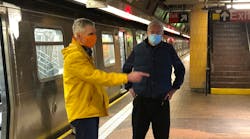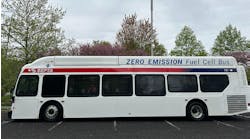The American Public Transportation Association (APTA), along with 10 transit agencies, held a virtual press conference July 28 to reiterate the transit industry’s need for an additional $32 billion in federal funding. Transit was not included in the proposed stimulus package released by Senate Republicans on July 27 and the $15.75 billion included in a House-passed proposal is short of what the industry needs.
The transit industry was provided $25 billion through the Coronavirus Aid, Relief and Economic Security (CARES) Act and while the agency and APTA participants on Tuesday’s press call expressed gratitude for the initial funds, additional funding would stave off what APTA President and CEO Paul Skoutelas called a “looming financial calamity.”
The general reasoning for the emergency relief funding is well known: Costs have increased as transit agencies have aggressively stepped up cleaning and disinfecting efforts, employee protections, such as the supply of personal protection equipment and driver compartment barriers, while revenues from fares, sales tax and other streams have dropped considerably.
Nuria Fernandez, general manager and CEO of the Santa Clara Valley Transportation Authority, said additional funds for the industry do not fall into the “nice to have” category, but are essential in helping agencies bridge the gap caused by the pandemic.
To drive home the need for additional funding, APTA released results of a July 2020 survey of transit CEOs that found:
• Almost one-third of public transit agencies have been forced to furlough employees or are planning future furloughs.
• More than one-third of public transit agencies have had to delay capital projects.
• Nearly one in five agencies have shifted funds from their capital budget to their operating budget.
• Public transit agencies need additional emergency funding to provide essential services as the pandemic continues.
The transit representatives on the call provided more local impacts of what the COVID-19 pandemic has done to their budgets, which include:
• The Washington Metropolitan Area Transit Authority losing $2 million per weekday in revenues since March;
• The Chicago Transit Authority (CTA) losing $1 million in fare revenues per day, which is anticipated to total $345 million in lost farebox revenue in 2020; and
• IndyGo accrual of an additional $1 million in cleaning expenses so far this year.
“The reality is that, without additional federal funds, we are left with some very difficult choices to deal with a looming financial crisis that run counter to the economic recovery we all want,” said Washington Metro General Manager and CEO Paul J. Wiedefeld.
Not a handout
Carl Sedoryk general manager and CEO of Monterey-Salinas Transit in California described how his agency, and many others in the industry, pivoted their services to provide food delivery to those experiencing food insecurity, utilizing Wi-Fi-equipped vehicles to ensure school kids could get their work done on a reliable connection and other services outside of transporting someone from Point A to Point B during the pandemic.
The area served by Monterey-Salinas Transit experienced growth in its unemployment rate from 3.5 percent to more than 20 percent. The jobs that remain are agriculture in focus and can not be performed from the isolation of a home, making transit service even more essential.
Metropolitan Transit Authority of Harris County President and CEO Tom Lambert said his agency serves Texas Medical Center, which is considered the largest medical center in the world. One-third of the center’s employees use transit to travel to work.
CTA President Dorval Carter explained additional federal funding would help him answer a key question posed by those essential workers who have used his agency’s services, “are you going to be there?”
Scott Smith, CEO of Valley Metro, told attendees on the call the additional funding ask was not a handout, but a safety net for transit agencies and an investment that pays returns in economic activity.
Palm Tran Executive Director Clinton B. Forbes shared a similar thought by saying “we are the ‘to’ in getting back to work.”
Calls from across the industry
The July 28 call was one of several the transit industry has held during the past month to support and remind elected officials of the need for more stimulus funding. While agencies of all sizes endorse more funding, a sticking point is the suggested distribution of potential funds.
APTA has requested that any additional emergency relief funding be distributed 80 percent through the existing Federal Transit Administration (FTA) Emergency Relief Program and the remaining 20 percent to be distributed through an immediate infusion for FTA formula grants.
A growing group of transit stakeholders, including small and mid-sized agencies and the Community Transportation Association of America, believe distributing funds in this way could favor larger agencies. This group of transit advocates believes the CARES Act distribution of funds was fair to all agencies and they are encouraging the same approach to any future federal funds.
Monterey-Salinas Transit’s Sedoryk was a co-signer of a letter sent last week to Congressional leaders urging CARES-Act distribution of any additional transit stimulus money, as well as a panelist on the July 28 APTA-led call. He did not mention the distribution proposal from APTA on the call. However, he did make a point that while smaller agencies are not matching losses of larger systems dollar-for-dollar, when converted to percentages, the losses experienced by small to mid-sized networks are equal to their larger counterparts.
The bottom line for small, medium and large agencies is that more funding is needed so that the answer is “yes” when they are asked “are you going to be there?”








